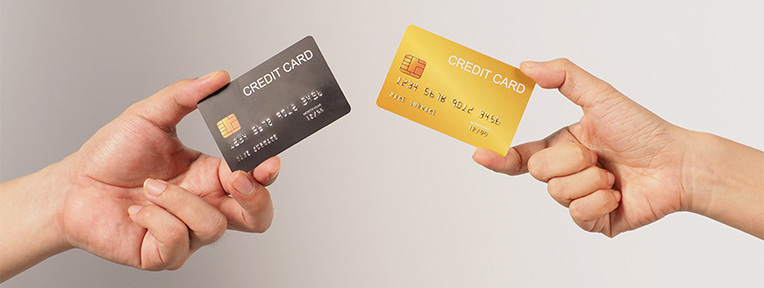
Business Credit Cards vs Personal Credit Cards
Posted on Tuesday, October 29th, 2024 | By IndusInd Bank
Whether it is an individual or a business entity, a credit card can be a convenient financial tool for both. Credit cards can help individuals and businesses manage expenses, improve cash flow, and earn rewards. However, not all credit cards serve the same purpose. When comparing a business credit card vs a personal credit card, one must first understand how each type helps cater to different financial needs.
Both types of cards provide financial flexibility. However, they serve different purposes and come with distinct features. In this article, we will explore the differences between business credit cards and personal credit cards and other related aspects.
What is a Business Credit Card?
A business credit card is designed to help business owners manage their company’s finances. These cards come with features such as higher credit limits and detailed expense tracking. In addition, the rewards are focused on business-related expenses (e.g., office supplies, travel). Business credit cards often allow multiple employee cards under one account. This can make it easier to manage team spending.
What is a Personal Credit Card?
A personal credit card is issued to an individual and is used for everyday personal expenses. This can include groceries, dining, or entertainment. These cards are designed to meet the needs of individuals or families rather than businesses. As such, they provide cashback, rewards, travel perks, or points for specific spending categories like shopping or fuel.
Differences Between Business Credit Card vs Personal Credit Card
Understanding the difference between a business credit card and a personal credit card helps in making the right choice. Here’s a closer look at some of the key differences between the two:
| Parameter | Business Credit Cards | Personal Credit Cards |
| Credit Limit | Tend to offer higher credit limits. This helps accommodate multiple business expenses. | Come with a lower credit limit, since it is only intended for use by an individual. |
| Rewards and Benefits | Offer rewards related to company-related spending. This can include travel, office supplies, and advertising. | Tend to offer rewards for day-to-day personal expenses like groceries, dining, and fuel. |
| Expense Management | Provide tools for tracking employee spending and organising business expenses. | Tracking expenses depends on the cardholder. Specific tools may not be available for the purpose. |
| Liability | The business is responsible for the card’s debt. | The individual cardholder is solely responsible for the debt. |
| Credit Impact | Usually report to business credit bureaus. This helps build the company’s credit profile. | Impacts only the individual’s credit score. |
| Employee Cards | Allow companies to issue additional cards to employees and set customisable spending limits. | No such feature may be available. However, cardholders can opt for an add-on card, connected to the primary account, for their loved ones. |
| Eligibility Requirements | Likely requires proof of a business entity and financial statements. | Have simpler eligibility criteria, such as income stability and a decent credit score. |
Thus, the above points must be kept in mind when comparing business credit cards vs personal credit cards to make the right choice.
When to Choose a Business Credit Card vs Personal Credit Card
- The decision between a business credit card vs a personal credit card depends on your financial goals and needs.
- If you run a business, a business credit card offers major benefits. It helps you manage cash flow, track expenses, and earn rewards specific to business-related purchases.
- On the other hand, a personal credit card is the way to go if your primary need is to manage personal expenses and build your credit score.
- It is important to evaluate your personal spending preferences to choose the right personal credit card.
- For instance, if you are someone who frequently makes UPI payments, you can consider the IndusInd Bank Platinum RuPay Credit Card. It offers 2 reward points for ₹100 spent through UPI. You can redeem these reward points in various ways, including receiving cash credit.
- Similarly, if you spend on dining and entertainment, a personal credit card offering cashback or reward points for such categories would be ideal.
Also Read: The Role of Credit Cards in Personal Finance
Conclusion
To sum it up, business credit cards cater to the needs of companies while personal credit cards help individuals to maximise everyday expenses. Whether you are a business owner or an individual, you must review your spending habits and financial goals before choosing between business credit cards vs personal credit cards.
IndusInd Bank offers a range of personal Credit Card options, each catering to different needs. So, whether you need travel-related perks, dining-related benefits, or shopping offers and discounts, we have a Credit Card for it all!
Apply Now for a Credit Card with IndusInd Bank today!
Disclaimer: The information provided in this article is generic and for informational purposes only. It is not a substitute for specific advice in your circumstances. Hence, you are advised to consult your financial advisor before making any financial decision. IndusInd Bank Limited (IBL) does not influence the views of the author in any way. IBL and the author shall not be responsible for any direct/indirect loss or liability incurred by the reader for making any financial decisions based on the contents and information.



 Offers
Offers Rates
Rates Debit Card Related
Debit Card Related Credit Card Related
Credit Card Related Manage Mandate(s)
Manage Mandate(s) Get Mini Statement
Get Mini Statement
 categories
categories Bloggers
Bloggers Blog collection
Blog collection Press Release
Press Release


